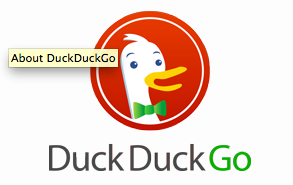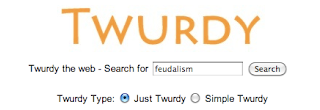So, over the next few weeks, we'll share some of our key learnings in these posts.
This week's topic: search engines.
For many of us, when we search it's a reflex movement towards Google, or perhaps Bing -- but these represent only a very small slice of the options available. Depending on the task at hand, and your target group of students, there are a wide range of options available. Here are a few (followed by a site where you can find all of the engines in one tidy spot).
 Duck Duck Go has several things going for it, including:
Duck Duck Go has several things going for it, including:- it does not use cookies / track you - sites like Google use what's called a "filter bubble" - they build a profile of your tendencies, and give you search results based on what they know about your habits. DDG gives a fresh search every time
- The interface is clean - ad free.
When you look at the results, there are a couple other cool features, too:
- If the site has an icon, it appears next to the entry.
- There are add-ons under the "More" menu - click on Goodies and you get math and science tools, specialized searches and helpful little items sorted by subjects.
Carrot2 is a nifty little "clustering engine." Basically, it takes results and groups them into visual folders, which you can look at in several formats...
Results can be shown as a color wheel, with the size of the slice representing the number of links.
The little dots to the right represent each page in the results -- when you select a title, the corresponding dots darken, and summaries of their content are give to the right.
You can also choose what they call a "foam tree" - same concept as above, with the size of the box representing the relative number of hits for that item.
Note: right now, the site is flash based, meaning it won't work on IPad browsers (except for those that have a workaround - more on that in future posts)... but they are converting over to HTML 5.
 This next tool - Twurdy - is an interesting one (in spite of a name that sounds vaguely obscene) - it returns search results, color coded according to the required reading level. It takes the site a little while to run its lexile algorithm, so be patient waiting for results, but the results can be well worth it...
This next tool - Twurdy - is an interesting one (in spite of a name that sounds vaguely obscene) - it returns search results, color coded according to the required reading level. It takes the site a little while to run its lexile algorithm, so be patient waiting for results, but the results can be well worth it...
As you can see, the entries are shaded different colors, which correspond to the color codes you see on the chart to the right.
This is a bit more specific than the results you get from one of my favorite search engines, which I detailed in an earlier post - instagrok.
Search Cube is another interesting way to see results - it gives you little images of each site, on a cube you can rotate...
This can be very useful with images and videos, and also is kind of fun to spin around...
 This last one is perhaps the most useful, from a teacher standpoint. Put in a search term, and get results sorted by category - lesson plan, text book, quiz / test, etc. Just go to http://www.goorulearning.org/
This last one is perhaps the most useful, from a teacher standpoint. Put in a search term, and get results sorted by category - lesson plan, text book, quiz / test, etc. Just go to http://www.goorulearning.org/
Each column is a different resource type - interactive activities, websites, tests, videos, lessons, slide shows... this can save a lot of time in planning - don't reinvent the wheel!
Looking for even more search engines? Hop on over to this symbaloo site: http://www.symbaloo.com/mix/learning2search - it has links to a couple dozen different ones, there's bound to be something you'll find useful.
Until next week!
Deremy









No comments:
Post a Comment